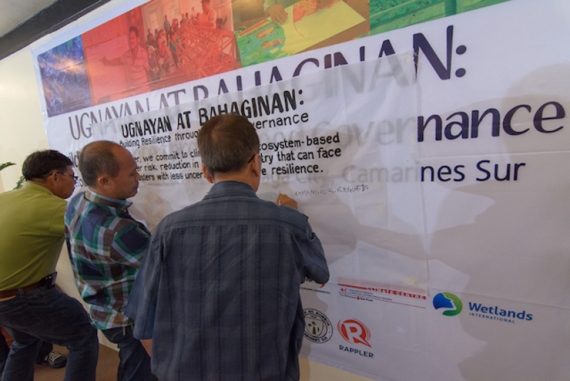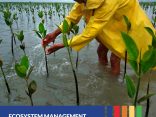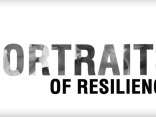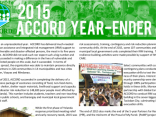
Conference Unity Statement
We, partners committed to building resilient communities:
Recognize that the Philippines is high risk to numerous natural hazards. These risks turn into disasters when the lives and livelihoods of our communities, especially the vulnerable, are negatively affected.
We also recognize the increasing frequency of hazard events and the magnitude of their impacts, brought about by extreme weather events and climate change. Further, the unabated degradation of our ecosystems limits their ability to regulate hazards, and to support community requirements for safe and sustainable living spaces. The combination of natural hazards, climate risks and ecosystem degradation has spawned chronic disasters for the Philippines, with the brunt of the damage mostly felt by the most vulnerable populations, year in and year out. Though there are initiatives to develop communities to decrease their vulnerabilities, these initiatives are usually set back by the recurring disasters thus slowing progress.
Community needs, natural hazards, ecosystem degradation and the changing climate are issues that we must face together.
Thus, we recognize the need for disaster risk reduction (DRR) programs that are climate-smart, ecosystem-based, interwoven among different areas, and attuned to specific needs of older people, children, persons with disability and other most vulnerable groups. Emergency response is not enough; taking actions when disasters strike is not enough. Disaster risk reduction in the form informing and educating the public, developing preparedness capacities, diversifying and making livelihoods sustainable, engaging in poverty reduction programs, and investing in cost-efficient mitigation are also necessary.
There are government units who have been able to incorporate some strategies of disaster risk reduction (DRR), climate change adaptation (CCA), and ecosystem management and restoration (EMR) into their DRR plans. Others have their own methods of facing and dealing with disasters. Together, all of us are here to learn from each other and to call on the national government to take up part in mainstreaming the DRR-CCA-EMR approach. Together, we will help each other realize the goals of the Hyogo Framework for Action by 2015.
Integrating inclusive DRR-CCA-EMR into development plans – from planning, implementation to monitoring and evaluation – in order to minimize risks and negative effects on communities ensures that the tenets of good governance is partly fulfilled through providing a safe, resilient, dignified, and risk-minimized environment for our countrymen. This is all the more important as the sunset review of our country’s DRR Law nears and we are pushed towards a newer, better version that is responsive to all stakeholders.
Today is the International Day of Disaster Reduction and on this day we take a step towards a safer direction. We will build communities that are able to face disasters with proper preparation and with disaster mitigation; communities that are empowered and can bounce back from disasters speedily and easily with the proper support of LGUs and the national government, and communities that are able to care for themselves and plan for their own safety using their own resources.
Today, we hear and learn from our fellow LGUs. Henceforth, we work hand in hand with them, the national government and other partners to create a resilient country.
We, partners for resilience:
• Recognize that natural upheavals will become more extreme under the changing climate and that the risks they pose are multiplied due to various vulnerabilities and environmental degradation;
• See climate-smart, ecosystem-driven disaster risk reduction that is community-based, inclusive and community-owned as suited for community-empowerment;
• Recognize the pivotal role of the national government in institutionalizing an inclusive DRR-CCA-EMR framework nationwide;
• Recognize that risks and hazards transcend administrative-political boundaries, so must disaster risk reduction programs;
• Seek to forge partnerships among different sectors to ensure that our goals are met.
We, local government units commit to:
• Incorporate inclusive DRR in local development plans and integrate risk assessments in contingency plans and risk reduction plans;
• Allocate a portion of our budget for capacity-building, drills, and other DRR-related activities;
• Strengthen our DRRM offices by having permanent point persons to man the office;
• Begin community risk assessments and community-based disaster risk management (CBDRM) for those without them;
• Periodically review contingency and risk reduction plans to ensure relevance;
• Commit to public awareness and advocacy activities;
• Participate in the DRRM Law sunset review;
• Share knowledge with other LGUs and cooperate with other LGUs within the same landscape.
We call on the national government to:
• Recognize and live up to its responsibility to proactively strengthen community resilience in the face of recurring disasters;
• Allot an adequate amount of the national budget for specific activities related to DRR-CCA-EMR and for agencies and offices that are responsible for such, and for local government units;
• Enhance capacities and coordination of all government units in planning, DRR work, etc. through trainings, technical support, and other activities;
• Incorporate inclusive DRR in national agency plans, including mainstreaming DRR in the school curriculum; commit to public awareness activities
• Continue support for recovery and resilience programs of communities and LGUs affected by Yolanda, Pablo and other large scale disasters, and by small, chronic disasters;
• Actively engage all stakeholders across different sectors in an inclusive, participatory and unbiased review of the DRRM law;
• Support risk assessments that are participatory, scientific, and built from the rich experience of communities;
• Harmonize environmental, climate change adaptation, and disaster risk reduction laws;
• Call to task other countries for not doing enough to reverse dangerous trends in international summits on climate change and environment;
Together, we commit to:
• inclusive, climate-smart, ecosystem-based disaster risk reduction in building a country that can face disasters with less uncertainty and more resilience.
Unity statement signed by participants calling for more government action towards strengthening community resilience. It was signed to close “Ugnayan at Bahaginan: Building Resilience through Good Governance,” a national conference that brought together ACCORD’s partner LGUs across the country to share and learn from each other’s experiences in DRR. The event was held in celebration of the International Day for Disaster Risk Reduction last October 13, 2014.
In photo: Mayor Eduardo Severo of Calabanga, Camarines Sur (second from the left) leads other LGU participants in signing the unity statement. (Jigs Tenorio / ACCORD)
PDF Download: Ugnayan at Bahaginan Unity Statement



